 Anyone that has seen the movie Forrest Gump remembers the music montage of Forrest running across the country. At one point, a truck splashes mud all over him, and a t-shirt salesman hands Forrest a yellow shirt to clean his face. Forrest wipes his face, returns the shirt, and says “have a nice day.” It was a classic piece of movie fiction. The reality is that the Smiley Company, which is celebrating its 50th birthday this year, created smiley as a symbol for good news in the newspaper France Soir in 1972. Today, The Smiley Company — which has trademarks on the term Smiley and the black-and-yellow version of the emoticon — has around 68 million licensed products that drive $573 million in annual sales across band partners. While the Forrest Gump story was fun, when you look at that smiley face, it looks like a precursor to Hanks’ volleyball friend Wilson. And now on to this week’s logistics news.
Anyone that has seen the movie Forrest Gump remembers the music montage of Forrest running across the country. At one point, a truck splashes mud all over him, and a t-shirt salesman hands Forrest a yellow shirt to clean his face. Forrest wipes his face, returns the shirt, and says “have a nice day.” It was a classic piece of movie fiction. The reality is that the Smiley Company, which is celebrating its 50th birthday this year, created smiley as a symbol for good news in the newspaper France Soir in 1972. Today, The Smiley Company — which has trademarks on the term Smiley and the black-and-yellow version of the emoticon — has around 68 million licensed products that drive $573 million in annual sales across band partners. While the Forrest Gump story was fun, when you look at that smiley face, it looks like a precursor to Hanks’ volleyball friend Wilson. And now on to this week’s logistics news.
- Amazon workers in Staten Island vote to unionize
- Walgreens to offer Wing drone delivery in suburban Dallas
- FedEx plans to test autonomous drone cargo delivery with Elroy Air
- Chipotle’s push for humane chicken delayed amid tight supplies
- Mexican factories gain in supply chain revamps
- Jokr prepping world’s first carbon-negative grocery delivery
- Air Canada wants more cargo jets 3 months after launching service
 Employees at an Amazon warehouse on New York’s Staten Island voted late last week to join a union, which is a painful defeat for the e-commerce giant that has aggressively fought unionization efforts in recent years. The Staten Island facility, known as JFK8, is Amazon’s largest in New York and now has the distinction of being the first in the US to unionize by voting in the Amazon Labor Union. Staten Island workers could challenge the company’s current labor model, which is the backbone of its Prime two-day shipping promise. Unions stand to disrupt the level of control that Amazon exerts over its warehouse and delivery employees, like its ability to unilaterally set the pace of work and hourly wages. Of the 8,325 workers eligible to vote, less than 60 percent actually voted. The tally was 2,654 votes in favor of joining the union and 2,131 opposed. There were 67 challenged ballots, a gap that’s too narrow to change the outcome of the election. The results still need to be formally certified by the National Labor Relations Board.
Employees at an Amazon warehouse on New York’s Staten Island voted late last week to join a union, which is a painful defeat for the e-commerce giant that has aggressively fought unionization efforts in recent years. The Staten Island facility, known as JFK8, is Amazon’s largest in New York and now has the distinction of being the first in the US to unionize by voting in the Amazon Labor Union. Staten Island workers could challenge the company’s current labor model, which is the backbone of its Prime two-day shipping promise. Unions stand to disrupt the level of control that Amazon exerts over its warehouse and delivery employees, like its ability to unilaterally set the pace of work and hourly wages. Of the 8,325 workers eligible to vote, less than 60 percent actually voted. The tally was 2,654 votes in favor of joining the union and 2,131 opposed. There were 67 challenged ballots, a gap that’s too narrow to change the outcome of the election. The results still need to be formally certified by the National Labor Relations Board.
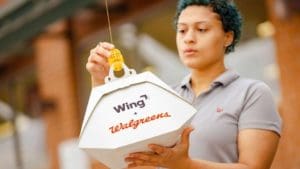 The first commercial drone delivery service in a major US metropolitan area launched this week in suburban Dallas, where Google-owned Wing began delivering items from Walgreens and a few other partners. Until now, drone delivery trials have been limited to small towns and rural areas, which are less congested. But Wing aims to prove it can provide on-demand deliveries in more complex urban settings as well. Wing said that it will stage its drones at retail partners stores so they can deploy their own dedicated fleet from their parking lot, roof, or nearby spaces. Store employees will fill customer orders, then use a tablet to summon the drone, and step outside to clip the package to the drone’s tether. Wing employees will oversee the delivery from a remote location. Aside from health and wellness products from Walgreens, prescription pet medications from easyvet and first-aid kits from Texas Health, Wing’s drones will also deliver pints of ice cream from Blue Bell Creameries.
The first commercial drone delivery service in a major US metropolitan area launched this week in suburban Dallas, where Google-owned Wing began delivering items from Walgreens and a few other partners. Until now, drone delivery trials have been limited to small towns and rural areas, which are less congested. But Wing aims to prove it can provide on-demand deliveries in more complex urban settings as well. Wing said that it will stage its drones at retail partners stores so they can deploy their own dedicated fleet from their parking lot, roof, or nearby spaces. Store employees will fill customer orders, then use a tablet to summon the drone, and step outside to clip the package to the drone’s tether. Wing employees will oversee the delivery from a remote location. Aside from health and wellness products from Walgreens, prescription pet medications from easyvet and first-aid kits from Texas Health, Wing’s drones will also deliver pints of ice cream from Blue Bell Creameries.
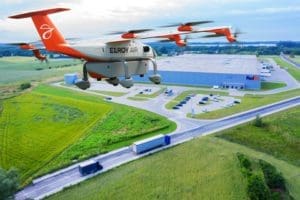 FedEx also plans to test autonomous drone cargo delivery, partnering with Elroy Air. FedEx Express is teaming up with California Bay Area-based Elroy Air, the company building the first end-to-end autonomous vertical take-off and landing (VTOL) aerial cargo system. As a first of its kind agreement in the US, FedEx Express will develop plans to test Elroy Air’s Chaparral autonomous air cargo system within the company’s middle-mile logistics operations, moving shipments between sortation locations. This is the latest initiative from FedEx in its effort to explore and adopt emerging technologies across its networks. FedEx and Elroy Air have been working together since January 2020 and will continue their collaboration to pursue certifications and begin flight testing in 2023.
FedEx also plans to test autonomous drone cargo delivery, partnering with Elroy Air. FedEx Express is teaming up with California Bay Area-based Elroy Air, the company building the first end-to-end autonomous vertical take-off and landing (VTOL) aerial cargo system. As a first of its kind agreement in the US, FedEx Express will develop plans to test Elroy Air’s Chaparral autonomous air cargo system within the company’s middle-mile logistics operations, moving shipments between sortation locations. This is the latest initiative from FedEx in its effort to explore and adopt emerging technologies across its networks. FedEx and Elroy Air have been working together since January 2020 and will continue their collaboration to pursue certifications and begin flight testing in 2023.
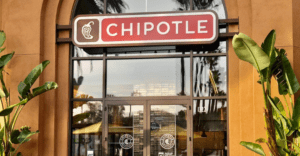 Chipotle Mexican Grill says its goal to source and sell chicken that’s certified as humanely raised has been delayed because its suppliers weren’t able to make the necessary changes without disrupting supply. Demand for chicken has surged in the last few years, as it is seen as a healthy and relatively cheap protein. Chipotle had planned to sell all third-party certified humane chicken by the end of 2021. However, the restaurant chain was unable to take this step last year amid high demand and its stringent requirements for poultry. In a statement, the company announced it will meet the goal by the end of this year instead. With more consumers pushing for supply chain transparency, Chipotle will be testing out RFID tags at its Chicago distribution center and at 200 Chicago stores to improve the traceability of its inventory systems. With these tags, Chipotle will be able to track ingredients all along the supply chain, so therefore if there is a food safety issue, it can be more easily traced.
Chipotle Mexican Grill says its goal to source and sell chicken that’s certified as humanely raised has been delayed because its suppliers weren’t able to make the necessary changes without disrupting supply. Demand for chicken has surged in the last few years, as it is seen as a healthy and relatively cheap protein. Chipotle had planned to sell all third-party certified humane chicken by the end of 2021. However, the restaurant chain was unable to take this step last year amid high demand and its stringent requirements for poultry. In a statement, the company announced it will meet the goal by the end of this year instead. With more consumers pushing for supply chain transparency, Chipotle will be testing out RFID tags at its Chicago distribution center and at 200 Chicago stores to improve the traceability of its inventory systems. With these tags, Chipotle will be able to track ingredients all along the supply chain, so therefore if there is a food safety issue, it can be more easily traced.
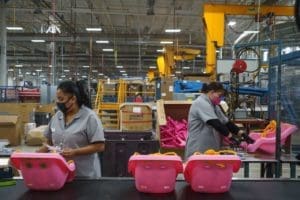 Ongoing global supply chain disruptions have many companies shifting supply chain strategies. And new data suggests Mexican suppliers are gaining ground as manufacturers reset their supply chains amid growing global disruptions. Last year, large American manufacturers solicited chemicals, produce, construction materials, and other goods from six times as many suppliers based in Mexico as they did in 2020, according to procurement software firm Jaggaer. At the same time, the number of suppliers in China that received procurement bids declined by 9 percent in 2021. The push for suppliers in Mexico comes as more companies say they are resetting their supply chains by adding suppliers and bringing some production closer to end users. The effort is aimed at bolstering resilience and reliability following a series of shocks to supply networks brought on by Covid-19 outbreaks, port bottlenecks, extreme weather, and geopolitical conflicts.
Ongoing global supply chain disruptions have many companies shifting supply chain strategies. And new data suggests Mexican suppliers are gaining ground as manufacturers reset their supply chains amid growing global disruptions. Last year, large American manufacturers solicited chemicals, produce, construction materials, and other goods from six times as many suppliers based in Mexico as they did in 2020, according to procurement software firm Jaggaer. At the same time, the number of suppliers in China that received procurement bids declined by 9 percent in 2021. The push for suppliers in Mexico comes as more companies say they are resetting their supply chains by adding suppliers and bringing some production closer to end users. The effort is aimed at bolstering resilience and reliability following a series of shocks to supply networks brought on by Covid-19 outbreaks, port bottlenecks, extreme weather, and geopolitical conflicts.
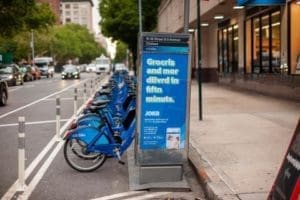 Fast grocery delivery continues to be a hot topic, and more companies are jumping into the mix. One company, JOKR, is focusing on New York City, and promises delivery in 15 minutes or less, with no order minimums, and a selection of products that you might find in the local deli or convenience store. The company has plans to become the first climate-positive instant grocery delivery platform in the world. TO do so, it is working with German green technology company Plan A, which has developed a software for carbon accounting; decarbonization; environmental, social, and governance (ESG) management; and automated reporting. Using this solution, Jokr will measure and account for its carbon emissions in line with internationally recognized Greenhouse Gas Protocol standards across all of its emissions sources for the base year 2022. Based on this, the software’s artificial intelligence will then develop a holistic, science-based strategy to decarbonize Jokr’s entire supply chain by 2030.
Fast grocery delivery continues to be a hot topic, and more companies are jumping into the mix. One company, JOKR, is focusing on New York City, and promises delivery in 15 minutes or less, with no order minimums, and a selection of products that you might find in the local deli or convenience store. The company has plans to become the first climate-positive instant grocery delivery platform in the world. TO do so, it is working with German green technology company Plan A, which has developed a software for carbon accounting; decarbonization; environmental, social, and governance (ESG) management; and automated reporting. Using this solution, Jokr will measure and account for its carbon emissions in line with internationally recognized Greenhouse Gas Protocol standards across all of its emissions sources for the base year 2022. Based on this, the software’s artificial intelligence will then develop a holistic, science-based strategy to decarbonize Jokr’s entire supply chain by 2030.
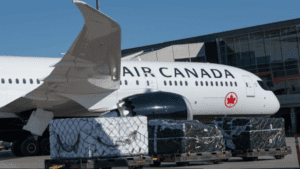 The first carrier in North America to return to a combination passenger-and-freighter fleet intends to invest in more all-cargo aircraft as logistics contributes more to long-term profitability, the company’s cargo chief says. Air Canada began flying its first Boeing 767-300 converted freighter in late December and the arrival of a second aircraft is imminent. Israel Aircraft Industries is remodeling older Air Canada passenger jets to carry heavy freight. Six more will be produced between now and the end of 2023, according to airline executives. The stand-alone freighter operations will help feed the globally connected passenger network to get goods to more destinations. The airline is already pursuing additional freighters.
The first carrier in North America to return to a combination passenger-and-freighter fleet intends to invest in more all-cargo aircraft as logistics contributes more to long-term profitability, the company’s cargo chief says. Air Canada began flying its first Boeing 767-300 converted freighter in late December and the arrival of a second aircraft is imminent. Israel Aircraft Industries is remodeling older Air Canada passenger jets to carry heavy freight. Six more will be produced between now and the end of 2023, according to airline executives. The stand-alone freighter operations will help feed the globally connected passenger network to get goods to more destinations. The airline is already pursuing additional freighters.
That’s all for this week. Enjoy the weekend and the song of the week, Smiley Faces by Gnarls Barkley.

















